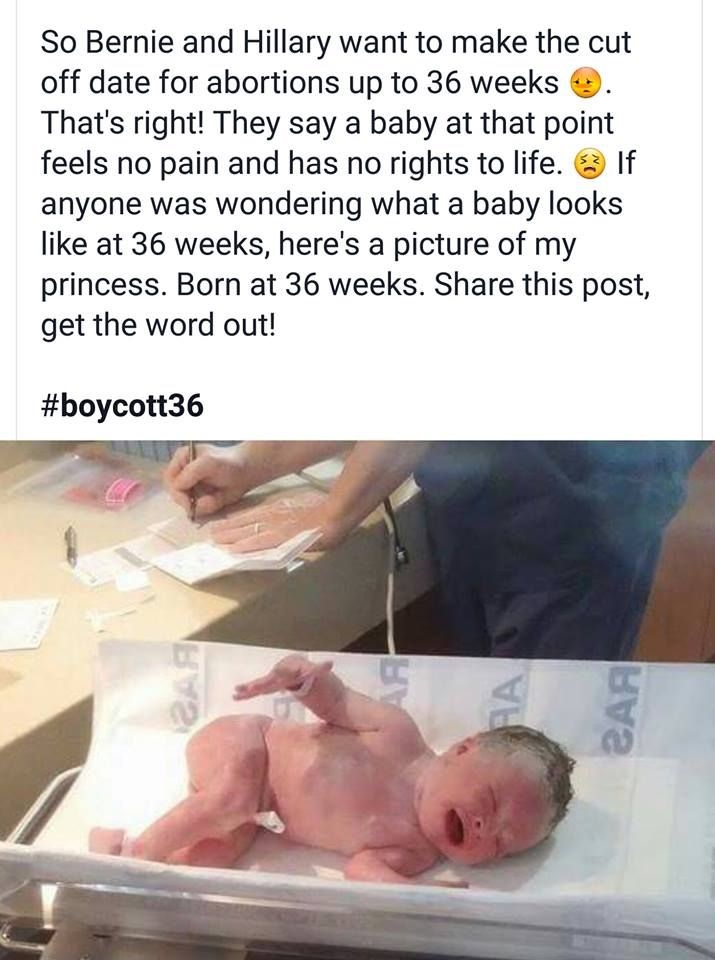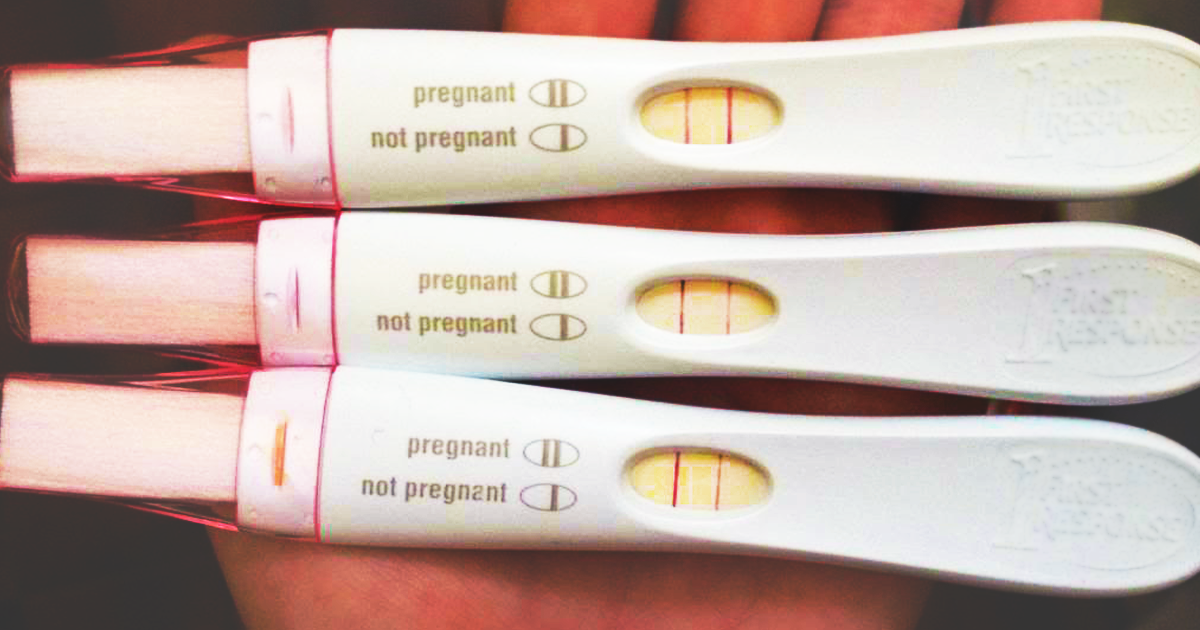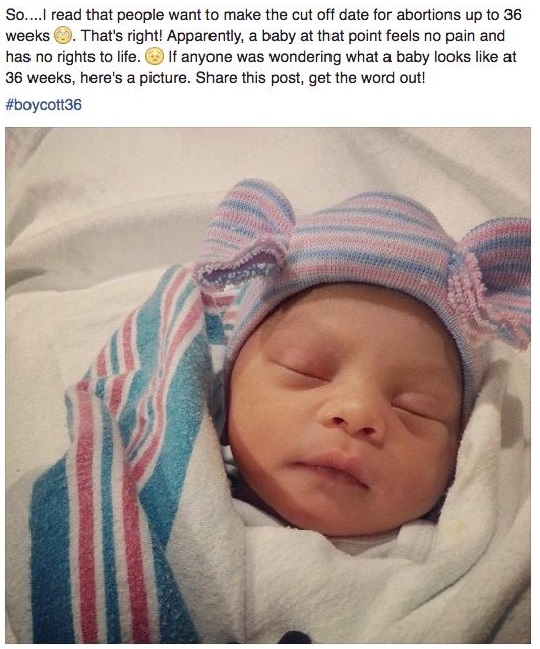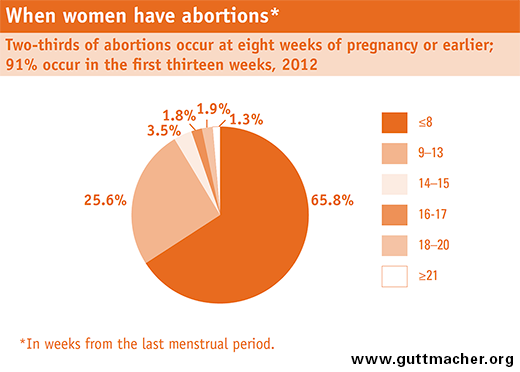Both Bernie Sanders and Hillary Clinton support abortion access with few restrictions, and Clinton indicated she would agree with late-term abortion bans if provisions were included for the health of the mother.
Clinton and Sanders didn't expressly seek to legalize all elective abortions up to 36 weeks, and neither candidate said that fetuses didn't feel pain or have rights.
On 6 May 2016, a Facebook user published a status update, which was shared thousands of times, claiming that presidential candidates Hillary Clinton and Bernie Sanders had specific and identical plans for abortions in the United States:

The post included a photograph of a newborn baby ostensibly born several weeks early and encouraged fellow social media users to "share this post" and "get the word out." This post employed the hashtag #Boycott36, although that tag did not appear to be part of any existing movement or initiative beforehand.
A previous Facebook status update was nearly identical in substance, but that earlier post mentioned neither Clinton nor Sanders, saying only that the poster had "read" that undefined "people" want to increase the limit for abortions to 36 weeks:
Both versions were vague and misleading. We contacted a clinic that provides late-term abortions to ask about the circumstances under which such a procedure would be performed, and they told us that terminations in the 36th week of pregnancy typically occur due to a fetal incompatibility with life (that is, the fetus would not survive to term) that was somehow not diagnosed until late into the pregnancy.
A May 2016 fact sheet published by Guttmacher did not include specific numbers about late-term abortions, but a chart indicated that only 1.3 percent of all abortions occurred after the 21-week mark:
In 2010, 2011, and 2012 (the most recent years for which statistics were available), the Centers for Disease Control recorded 765,651 abortions, 730,322 abortions, and 699,202 abortions respectively. A three-year average of those numbers was 731,725. 1.3 percent of that average worked out to roughly 9,512 abortions at or after the 21-week mark per year.
According to Guttmacher, 43 states expressly prohibit abortion either after the fetus was viable or at a specific numerical point in the pregnancy [PDF]. The "#Boycott36" claim did not mention the fact that abortions were already illegal at or past the 20-week point in all but seven states and the District of Columbia.
Both Sanders and Clinton list their positions on the issues on their campaign web sites. Clinton's position can be found on the "Women's rights and opportunity" section of her site, and it does not mention raising gestational age limits for abortion:
Women’s personal health decisions should be made by a woman, her family, and her faith, with the counsel of her doctor. Hillary will stand up to Republican attempts to defund Planned Parenthood, which would restrict access to critical health care services, like cancer screenings, contraception, and safe, legal abortion.
Sanders' position is more detailed, but again does not mention raising gestational age limits in any way:
Bernie believes in protecting a woman’s right to choose and has a lifetime pro-choice record. In 1993, he co-sponsored the Freedom of Choice Act, which aimed to bar states from restricting the right to terminate a pregnancy before fetal viability or at any time when a termination is necessary to protect the health of a woman.
In an op-ed for the Huffington Post published in April 2012, Bernie wrote “We are not returning to the days of back-room abortions, when countless women died or were maimed. The decision about abortion must remain a decision for the woman, her family and physician to make, not the government.”
During his 16 years in the House of Representatives and 8 years in the Senate, Bernie has consistently supported a woman’s right to choose a safe abortion.
In addition to co-sponsoring the 1993 Freedom of Choice Act, Bernie voted numerous times to allow women to travel interstate for abortions, supported permitting federal funding of organizations that conduct abortions, voted to increase access and funding for family planning for women, and co-sponsored the Women’s Health Protection Act of 2013, which prohibited many limitations on abortions. In March 2008, Bernie voted against defining an unborn child as eligible for State Children’s Health Insurance Program (SCHIP) and in turn defining life as beginning at conception.
In light of these votes, Bernie has repeatedly received ratings of 100 percent from NARAL Pro-Choice America, and ratings of 0 percent from the National Right to Life Committee, indicating a pro-choice stance.
Both Sanders and Clinton spoke about their positions on the topic of abortion during a March 2016 "Town Hall" appearance on Fox News. Sanders said he supports fewer restrictions than Clinton:
While both candidates -- like most Democrats -- are both well known as in favor of abortion rights, they gave slightly different answers on the question of late-term abortions.
Asked generally whether abortion should ever be illegal, Sen. Bernie Sanders said, "I happen to believe that it is wrong for the government to be telling a woman what to be doing with her own body."
He chided Republicans who broadly oppose government interference in people's personal lives, "but somehow on this issue they want to tell every woman in America what she should do with her body."
Asked more specifically if he would support restrictions on abortions for pregnancies farther along than five months, Sanders simply responded, "I am very strongly pro-choice. That is a choice to be made between a woman, her physician and her family."
Clinton, by contrast, noted that she has gone on the record as in favor of some "late-pregnancy regulation that would have exceptions for the life and health of the mother."
However, Clinton stressed that she objects to the recent efforts in Congress to pass a federal law banning abortions after 20 weeks with no exceptions. "Under Roe v. Wade, it is appropriate to say in these circumstances" that abortion rights may be restricted, she said -- "so long as there's an exception for the life and health of the mother."
Neither Sanders nor Clinton have expressly argued for "36-week abortions," nor is that policy embraced or argued for by most pro-choice groups. Only 1.3 percent of abortions occur at or after the 21-week mark, and only seven states allow late-term abortions. We were also unable to locate any statements from either Hillary Clinton or Bernie Sanders maintaining that late-term fetuses felt no pain or had any rights.
The "36 week abortion" (or #Boycott36) rumor was one of several inaccurate claims about abortion to circulate on social media during the 2016 elections. In November 2015, claims about a scientifically discredited "abortion reversal" procedure circulated, and two separate rumors misleadingly claimed support was growing for "post-birth abortions." In April 2016, another rumor made rounds regarding an abortion doctor purportedly strangling a baby born alive, a claim that was actually based on an incident that was nearly four decades old.



